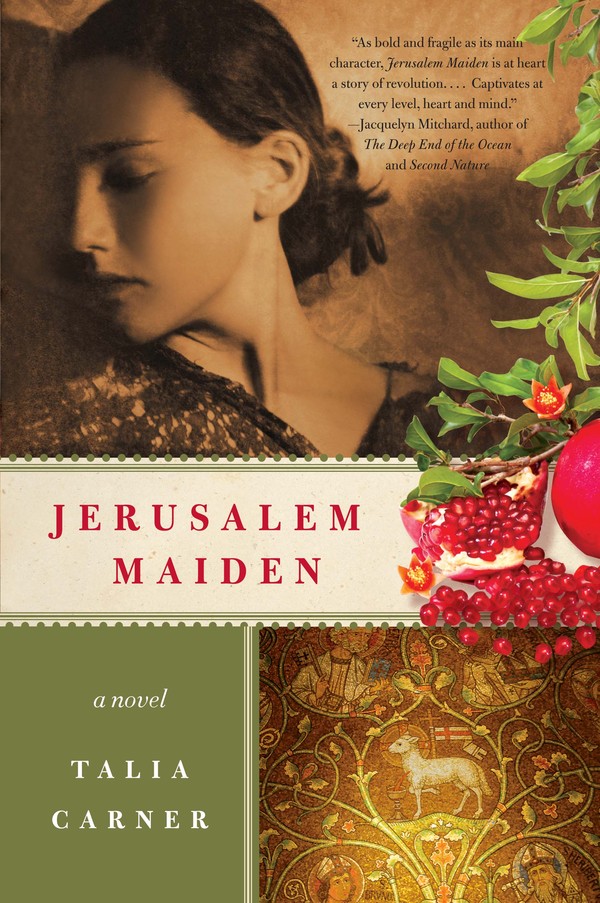
“
To my grandmother, Esther (Yanovsky) Lederberg, 1900-1980, for your untapped genius and unfulfilled destiny.” —Dedication of “Jerusalem Maiden.”
Israeli author Talia Carner walked the streets of Paris for the first time when she was 16 years old. And in the hilly, artistic village of Montmartre, a revelation flooded the young girl as she looked over the city.
She knew with an unshaken knowledge that her grandmother, Esther Lederberg, should never have married, Ms. Carner, a part-time Bridgehampton resident, said during a telephone interview last week. She shouldn’t have had children.
She was meant to be a Bohemian living in Paris, working as an artist, Ms. Carner said. And she had never fulfilled her destiny.
“I, of course, wouldn’t be speaking to you today,” Ms. Carner said. “But I was inspired by my grandmother’s untapped artistic genius and so I wrote a ‘what if’ novel. What if my grandmother, who was extremely talented as an artist, bolted and pursued that talent?”
The result was Ms. Carner’s most recent venture, “Jerusalem Maiden,” which hit book shelves in June. Set in Jerusalem 100 years ago, the historical fiction novel follows the feisty, ultra-orthodox protagonist Esther from when she was 12 through her mid 20s as she struggles between staying true to herself—and her forbidden love for art—or God.
The author wrote the entire novel on the East End, she said. She began in 2001 by gathering research about Jewish women living in Jerusalem in the late 19th century, through historians and interviews with older Israeli women about the nuances of their mothers’s lives, she reported. And, of course, she learned more about her grandmother.
“I always had a sense of her. I was close to her,” Ms. Carner said. “She wasn’t a good mother. She was a very frustrated, angry woman. By the time she was a grandmother, she had accepted her lot in life. She tried so hard to appease everybody, to make up for her younger years, but no one ever forgave her. That broke my heart.”
Other than the historical elements to the novel and her grandmother’s personality traits, the “Esther” character and the adventures she goes on are completely fictional, Ms. Carner said.
“I had to crawl into the skin of this young woman in this very restrictive society as she tried to find freedom,” Ms. Carner explained. “There was this sense that any errant woman would bring such dire consequences that would affect the community, the Messiah’s arrival and, therefore, the salvation of the Jews around the world. That’s a heavy burden on a 12-year-old child.”
During her journey, Esther connects many of the tragedies in her life to her pursuance of art. She thinks God is punishing her, and, as a young girl, vows to give up art forever. Her perception of God, how it crouches in her head, is Esther’s antagonist.
As an obedient “Jerusalem maiden” would, Esther marries and raises a family with her husband, Nathan. But when he travels to Europe on business, she spontaneously follows him soon after.
It was a twist in the novel that Ms. Carner said she never expected.
“Every time you, as a reader, were surprised, I was surprised,” she said of the journey her protagonist took in the book. “The trip to Paris is a good example. I did not see that coming. All of a sudden, she took off to Paris. I said to my husband, ‘Esther went to Paris! I need to follow her.’ He said, ‘Okay, darling,’ and that’s what I did.”
Listening to the breaking waves and chirping birds outside her Dune Road home in Bridgehampton, Ms. Carner wrote 10 to 16 hours a day, six days a week, she said. For this novel, the net total of research, writing and editing was five years.
“It’s like being in a trance. It’s like being in a dream,” Ms. Carner said of the writing experience. “My eyes are glazed over. I can’t listen to any conversations. I’m just so absorbed in my story.”
The author said that she always crafts her novels around strong protagonists. And how an individual rises above society—or succumbs to it.
“I don’t write about weak protagonists because the story ends in the first line,” she said. “It’s not interesting. What’s interesting is a strong person, a capable person who is caught up in an impossible situation and how she rises above or maybe ends up being broken by it.”
In Ms. Carner’s first novel, which was never published, she took a look at the Russian mafia. Her first released book, “Puppet Child,” went up against the United States justice system. Her next novel, “China Doll,” challenged two world superpowers—the American and Chinese governments. In “Jerusalem Maiden,” Ms. Carner took on God.
“I suppose there’s nowhere for me to go from here,” she said with a laugh. “I decided my next novel would be a very small domestic drama. Small. Tiny. No big canvas. But sure enough, I’ll be finding myself in the Amazons.”
And more than likely, she’ll be writing it from her home in Bridgehampton.